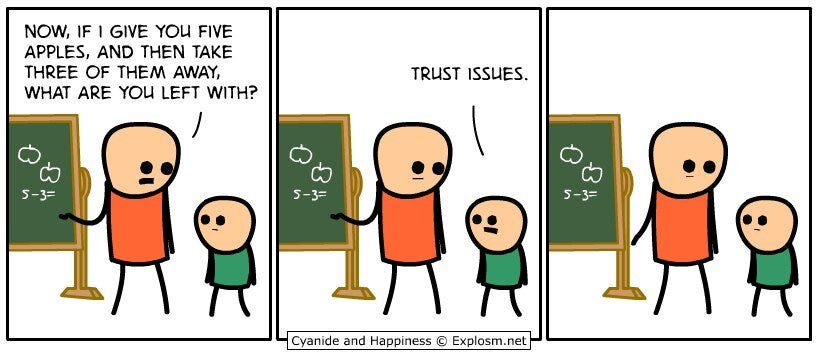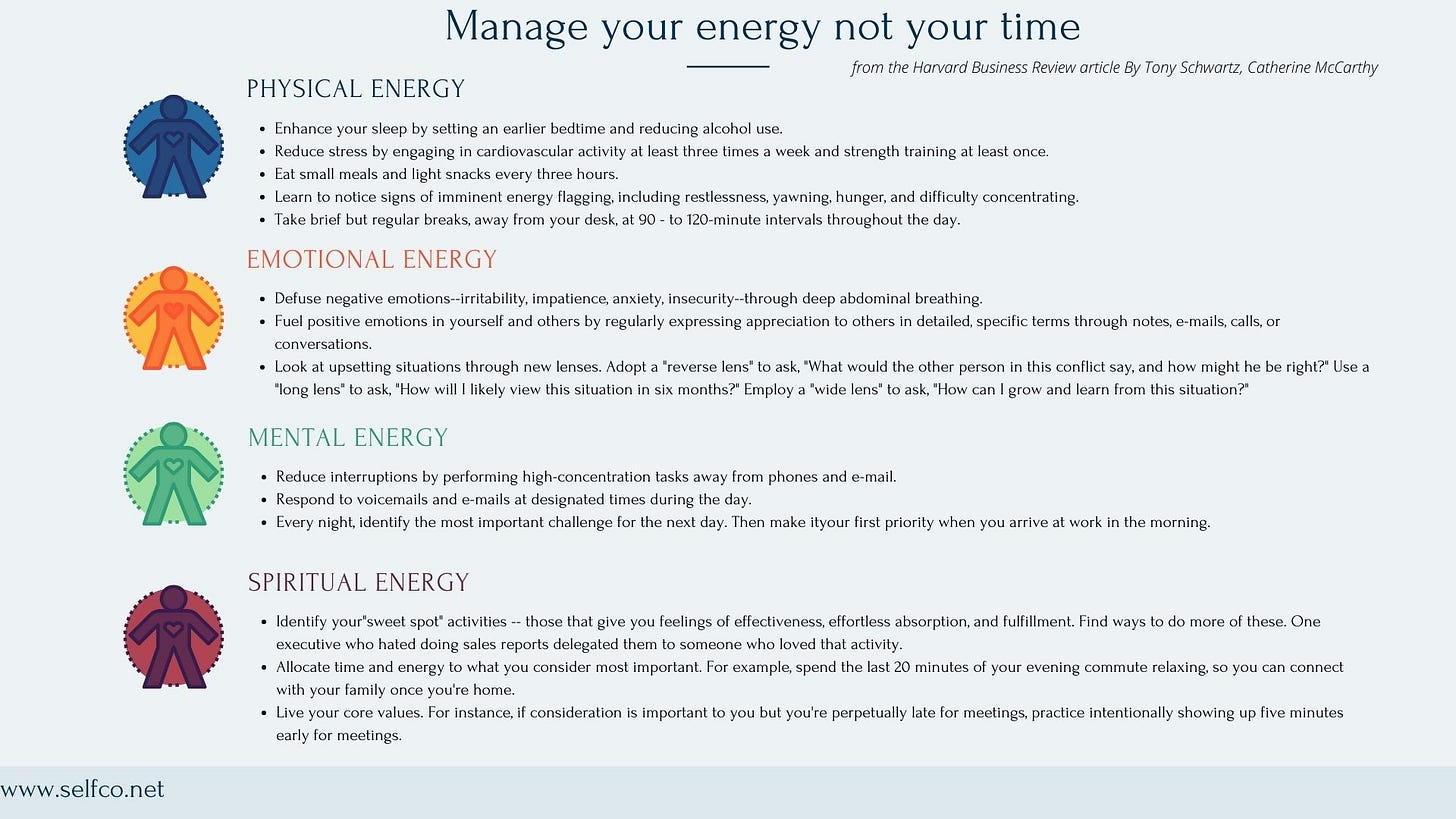5 steps to be a more effective leader - Trust me, this works 😉
Let's face it, being a manager and leading people is difficult. You have the power to make someone's life miserable. Here are some tips to be a kick-ass one!
What makes for an effective manager?
Drawing on Kim Scott's definition from her book, Radical Candor, a manager is someone who guides a team in achieving results.
Building a team starts with having the right people, at the right places, and with the right resources.
And now that you have your winning team, how to keep employees engaged?
I've asked leaders to answer this question. They all offer different strategies. Yet, I’ve found that there is a common theme among them: Building Trust.
Have you ever worked with people who didn't trust one another? Have you ever worked for a manager that you didn't trust? Or have you been dating someone untrustworthy?
If yes, then you'll know how challenging and draining this process can be.
Trust is the fuel of psychological safety.
Kenneth M. Nowack, Ph.D. and Paul J. Zak, Ph.D, two researchers and experts, explored the interconnection of trust and psychological safety. One of their recent studies analyzed a representative sample of working adults in the United States and found that working in companies in the top quartile of trust—compared to those in the lowest quartile—have 106 percent more energy at work.
In addition, they’re 76 percent more engaged and 50 percent more productive. What’s more, employees reported 40 percent less job burnout and even took 13 percent fewer sick days. Those privileged to work in high-trust companies were also 29 percent more satisfied with their lives outside of work.
Trust is a verb.
It is essential to all relationships, as it creates a sense of safety. When team members feel safe, they feel comfortable opening up, taking appropriate risks, and exposing vulnerabilities. Without building trustworthy relationships, you can't know people; you can't understand what motivates or guides them. And in today’s digital workplace, where more individuals work remotely, the ability to cultivate meaningful work relationships has become more complex and requires more intentional effort.
At times, trust can center on someone’s ability to do a specific task and whether we can place our confidence in them. That's called cognitive Trust. The other side of trust is Affective Trust – trust in someone’s capacity for caring and their candor, which means they will do the right thing.
Trust is not something you do once and are done with it. It's an ongoing, fragile-like seed similar to an orchid flower. You have to invest time and energy to grow it and make it last.
There are many things that you, as a leader can do to build trust. Both cognitive and affective are essential in building psychological safety and team effectiveness. You probably know how to build cognitive trust. So, here are 5 types to grow the affective trust.
How to build trust?
1. Invest in Relationships
Humans are hardwired for connection.

We all desire to be seen, heard, and valued. Having regular work and business meetings doesn't build relationships. You are busy improving the bottom line, launching products, or managing a large team. You can't have a relationship with everyone, and you don't have time for that. But you can get to know the people who report directly to you. Not an easy task! And the more ascend in an organization, the more difficult it will become, for reasons such as power dynamics, boundaries, time pressure, fear of conflict, and so on.
So, be intentional and schedule time to get to know your team members. Schedule a regular meeting - even 15 minutes to check-in, without a defined agenda. And do it with all team members, regardless of the relationship maturity.
2. Treat people how they want to be treated
When I work with individuals who struggle with love relationships, I usually invite them to get familiar with love languages. I often direct them to Gary Chapman’s influential book, The Five Love Languages: How to Express Heartfelt Commitment to Your Mate. Chapman identifies five general ways romantic partners express, experience, and prefer love. Once identified, these love languages can help both partners communicate and receive love.
I have found that in the workplace, individuals also have different love languages. Here is how we might translate the five love languages, as described in the book, to the workplace context:
These categories were adapted for the workplace by Dr. Chapman and the psychologist Paul White and became “languages of appreciation.”
Each person is unique; getting to know them personally is essential; caring and understanding their love language enables managers to treat others as they would like to be treated and not treating them how they themselves want to be treated.
See the difference?
We all tend to speak our own language of love/appreciation by nature. For example, a co-worker's primary love/appreciation language might be new projects; quality time is second. So, if you are their boss, and your love language is words of affirmation, you only send them ‘Thank you’ messages or appreciation by email and ask them to take on routine work, they'll become disengaged.
Maintaining these sensitive forms of appreciation has to start with listening to people, staying attuned to their needs. One way to address this might involve getting more curious about the other person, listening, observing, asking questions, or running a "how to work with me" workshop.
3. Put Your Oxygen Mask on First
Put your mask on first before assisting others.
This can sound counterintuitive for managing a team.
But, as the boss, you are an engagement vehicle and your energy is contagious. You have the power to impact meetings and people. If you, the boss, are in survival mode, then you can't help others who are going through burnout, bore out, or any other emotional exhaustion. Moreover, wellness programs won't work unless you model a balanced life and encourage team members to care for themselves.
Tony Schwartz and Catherine McCarthy identify four main energy wellsprings from Energy Projects: The body, emotions, mind, and spirit. In each, establishing simple rituals can lead to striking results.
4. Be Candid
As a manager, giving honest feedback to each of your team members is a duty. Helping each person on your team grow in the direction of their dreams is part of being a kick-ass leader.
From coaching conversations, I often hear, “How do I deliver honest feedback while still demonstrating care and concern for my direct report? How do you tell someone that he, she, or they are doing something stupid, without ever using the word “stupid” in the sentence?
The framework in Kim Scott’s book, Radical Candor, may help you doing it in candid and authentic way:
5. Be Aware of Defining Moments of Trust
Those moments are challenging moments that can either strengthen trust or destroy it. Death, illness, divorce, or a significant loss or personal tragedy can be tricky topics.
In such moments, people want to know that you have their back, and that you can lead with compassion - meaning caring, having empathy, and still doing what's best for them.
My grandma used to say that we can’t wash the stairs from the bottom, we must start with the top. As a leader, it's essential that you walk the talk. Show your team members & colleagues how critical trust is to you by nurturing and demonstrating your trust in them.
Because this leadership series is new, I’d love your feedback on what you like and don’t. Please email me at siham@selfco.net You can also find me on LinkedIn.
✨ We all need some poetry in our life ✨
Invitation by Mary Oliver
Oh do you have time
to linger
for just a little while
out of your busy
and very important day
for the goldfinches
that have gathered
in a field of thistles
for a musical battle,
to see who can sing
the highest note,
or the lowest,
or the most expressive of mirth,
or the most tender?
Their strong, blunt beaks
drink the air
as they strive
melodiously
not for your sake
and not for mine
and not for the sake of winning
but for sheer delight and gratitude –
believe us, they say,
it is a serious thing
just to be alive
on this fresh morning
in the broken world.
I beg of you,
do not walk by
without pausing
to attend to this
rather ridiculous performance.
It could mean something.
It could mean everything.
It could be what Rilke meant, when he wrote:
You must change your life.
Sources Radical Candor, by Kim Scott
On managing yourself, HBROn Leadership, HBR
The five love languages, by Gary Chapman
EVP, SVP, VP & Directors level interviews
Diversity & Equity courses, Cornell University
In team we trust - article







